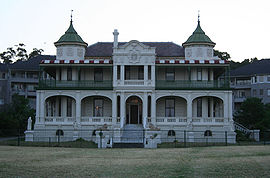Abbotsford, New South Wales
|
Abbotsford Sydney, New South Wales |
|||||||||||||
|---|---|---|---|---|---|---|---|---|---|---|---|---|---|

Abbotsford House
|
|||||||||||||
| Population | 5,112 (2011 census) | ||||||||||||
| • Density | 5,100/km2 (13,000/sq mi) | ||||||||||||
| Postcode(s) | 2046 | ||||||||||||
| Area | 1 km2 (0.4 sq mi) | ||||||||||||
| Location | 10 km (6 mi) from Sydney CBD | ||||||||||||
| LGA(s) | City of Canada Bay | ||||||||||||
| State electorate(s) | Drummoyne | ||||||||||||
| Federal Division(s) | Reid | ||||||||||||
|
|||||||||||||
Abbotsford is a suburb in the Inner West of Sydney, in the state of New South Wales, Australia. Abbotsford is 10 kilometres west of the Sydney central business district in the local government area of the City of Canada Bay. Abbotsford sits on the peninsula between Abbotsford Bay and Hen and Chicken Bay, on the Parramatta River.
Abbotsford took its name from Abbotsford House, owned by Sir Arthur Renwick. He named his property after Abbotsford House in the United Kingdom, the residence of historical novelist and poet, Sir Walter Scott.
Abbotsford was first known by its Aboriginal name Bigi Bigi.
The suburb was originally part of Five Dock Farm and when subdivided in 1837, was called Feltham. Sir Arthur Renwick, a doctor, philanthropist and politician built his home here in 1890 and called it Abbotsford House in honour of Sir Walter Scott's home. Renwick sold his property in 1903 to Albert Grace, and in 1918 it became the site of a Nestlé chocolate factory, with the house used initially for chocolate production and later as their administrative offices. The factory was closed in 1991, after which the area was redeveloped as the medium-density Abbotsford Cove housing complex.
Australian poet Henry Lawson did not die in Abbotsford House in 1922, as is sometimes claimed, but at the home of Mrs Isabella Byers at 437 Great North Road, recently demolished. Abbotsford House is now listed on the Register of the National Estate.
...
Wikipedia
